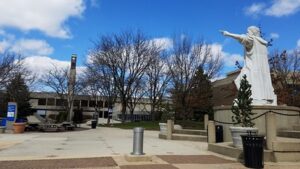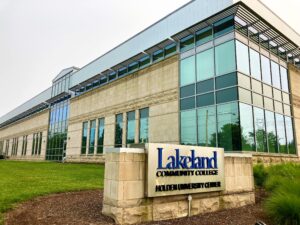If you follow higher education news, you know that colleges and universities all over the United States are closing or warning of impending closures. This week, two institutions – King’s College in New York City and Alderson Broaddus in Phillipi, WV announced that they are shutting their doors.
Both institutions are private, religious schools, but that has less to do with their closures than their financial instability does. King’s College, an evangelical Christian school, moved to Manhattan from update New York a few years back in a daring bid to increase its enrollment. Evangelical Christianity is apparently not a big seller in the Big City either. Although the administration at King’s College swears that the school is not closing, it has laid off 70% of its remaining employees and has facilitated the transfer of its students elsewhere. It has no plans to offer any classes for the remainder of 2023.
Alderson Broaddus is a Baptist university that found itself stripped of its ability to award degrees this week. The Higher Learning Commission, which accredited Alderson Broaddus, said that the school “voluntarily resigned” its accreditation. Like King’s College, Alderson Broaddus has experienced serious financial problems and declining enrollment. Those two conditions aren’t unrelated, but only one of them will torpedo your accreditation.
These schools are among a small but growing collection of institutions that will exit the game in 2023, primarily due to financial problems. Cazenovia College, which operated for 200 years in New York led the way. Like King’s and Broaddus, it too had serious financial difficulties. The institutional obituary will say that Cazenovia was undone by its inability to stay ahead of its bond debts.
Lack of vision, not lack of students shutter higher education institutions
Cazenovia and the others were undone by their “leaders” who – no doubt – were paid handsomely to run them. But amid the challenges of declining enrollment, those same “leaders” had no plans or ideas to reverse their ill-fortunes. Absent any plans, their Boards blindly followed the advice of these “leaders” to borrow heavily to pay for their ill-advised construction projects and their executive payrolls, when basic bookkeeping counseled otherwise.
Cazenovia, King’s and Broaddus have plenty of company. City College of San Francisco, the University of Upper Iowa, New Jersey City University, and Fulton Montgomery Community College all have had significant financial difficulties brought on not by declining enrollment, but rather by the poor financial decisions made by their “leadership.”
The lesson here should be this: it is very easy to gamble with someone else’s money. After all, the consequences of a bad decision don’t belong to the decision-maker. Whether it’s the institution’s own funds, USDA loans, profligate purchasing or whatever, higher education administrators rarely make truly savvy decisions about spending, building, buying, borrowing, and hiring. Board members and trustees are rarely capable of understanding the outsized risks and the underwhelming rewards of the decisions they’re signing off on.
These institutions have been undone by their so-called leaders whose grand plans rely on increasing enrollment, but who do nothing to make that happen. They bring no ideas to the table, preferring instead to rely on miracles of one kind or another. They have full decision-making authority yet have no understanding of risk. Worse, they face no consequences for their clownish failures from the people who provide their oversight yet lack any shred of vision for what the institution should be.
These are truly cases of the blind leading the blind.
Photo Credit: Shantanu Dutta , via Flickr



















